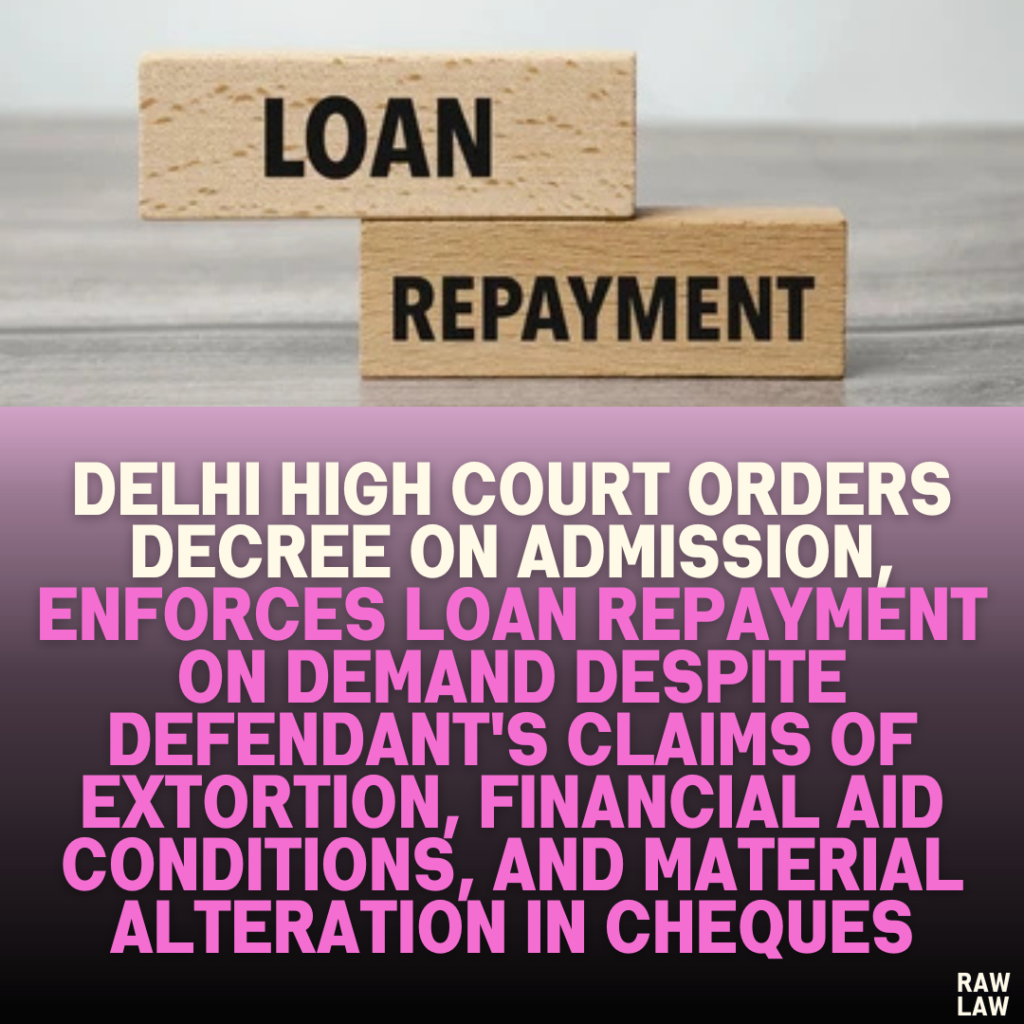Court’s Decision:
The Delhi High Court, presiding over a suit for recovery, granted a decree based on admissions under Order XII Rule 6 of the CPC. The Court held that the defendant’s acknowledgment of receiving Rs. 66.7 crores from the plaintiff created a binding repayment obligation, dismissing the defendant’s contention that repayment was conditional on her financial capability. The Court reasoned that “once it is admitted that the amount is repayable, it has to be on the demand of the giver rather than on the ability of the payer.” Consequently, the Court found the defendant’s defense to be vague and without merit, warranting a decree based on admissions.
Facts:
The plaintiff lent a total of Rs. 66.7 crores to the defendant, allegedly to support her during financial difficulties. The loans were provided based on familial ties, and the defendant issued several cheques to the plaintiff as repayment security. However, these cheques were dishonored due to insufficient funds, leading the plaintiff to initiate legal action to recover the loaned amount. The defendant contended that the funds were extended out of love and affection with a mutual understanding that repayment would occur only if and when she was able.
Issues:
The main legal questions were:
- Whether the acknowledgment of the loan created an enforceable obligation for the defendant to repay on demand, as argued by the plaintiff.
- Whether the defendant’s claims of financial aid and extortion were valid defenses against the repayment claim.
Petitioner’s Arguments:
The plaintiff argued that the loan was provided with the understanding of prompt repayment on demand, substantiated by signed cheques given by the defendant. The plaintiff requested judgment on admission, as the defendant admitted receiving the amount without conditions on repayment.
Respondent’s Arguments:
The defendant contended that the funds were given out of familial affection and were to be repaid only when she was financially capable. She claimed to have been the victim of an extortion scheme that necessitated the borrowing. Additionally, she argued that the plaintiff, aware of her financial challenges, had no right to demand repayment within a fixed period.
Analysis of the Law:
The Court examined Order XII Rule 6 of the CPC, emphasizing that a judgment on admission can be passed when admissions are unambiguous and unequivocal. The Court highlighted precedents, asserting that a defense lacking merit could be dismissed without a full trial.
Precedent Analysis: The Court cited Karan Kapoor v. Madhuri Kumar and R.K. Markan v. Rajiv Kumar Markan, establishing that clear admissions can justify a judgment without trial, especially if the defense is found to be frivolous or merely delaying justice.
Court’s Reasoning:
The Court noted the defendant’s contradictory claims regarding repayment conditions, which indicated a lack of credible defense. Although she alleged financial aid conditions, the Court emphasized that once a repayment obligation is acknowledged, it becomes enforceable on the lender’s demand. Additionally, the Court dismissed the defendant’s reliance on undated cheques, clarifying that filling dates on cheques did not constitute material alteration under Section 87 of the NI Act, especially in light of the presumption under Section 139.
Conclusion:
The Court granted a decree on admission, stating that the defendant’s inconsistent and vague defense could not negate her admission of the loan. The judgment reinforces that loan repayment is obligatory upon demand unless specifically agreed otherwise.
Implications:
This judgment underscores the enforceability of loans acknowledged as repayable, dismissing defenses that lack substantiation. It further clarifies that admissions under Order XII Rule 6 provide grounds for judgment without a full trial if defenses are legally untenable.
